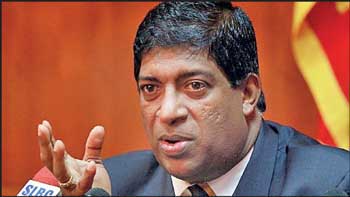Tuesday Feb 17, 2026
Tuesday Feb 17, 2026
Saturday, 10 August 2024 00:02 - - {{hitsCtrl.values.hits}}
 |
| Former Finance Minister Ravi Karunanayake |
A novel public administration mechanism with digitalisation of official services and modernisation of procedures of State institutions is an urgent need in line with the current economic and social requirements of Sri Lanka, former Finance Minister Ravi Karunanayake emphasised.
The Government has been implementing necessary reforms for effective human resource management in the public service.
He highlighted the need to replace the outdated system of issuing circulars with a new, updated digital system for Government decisions, directives, and guidelines.
The current administration is developing IT systems and online platforms to manage human resources efficiently by reengineering processes, thus minimising unnecessary steps and delays. President Ranil Wickremesinghe has instructed relevant authorities to introduce reforms to create a future-oriented public administration mechanism through digitisation. The goal is to enhance efficiency, productivity, transparency, accountability, and people-centred decision-making in public service human resource management.
These objectives are expected to be achieved using new public management and digital-government methods. Necessary changes are being implemented to ensure efficient and effective public service delivery and to improve job satisfaction for the 1.4 million public sector employees.
The Government’s aim is to streamline public service functions through a modern human resource management system, eliminating unnecessary paperwork and archaic circulars, Karunanayake stated.
The Government is also working to increase transparency in the public service through digitisation and the use of IT tools. Introducing simpler work processes in the public service is a priority for the President to create a service that meets the needs of the future generation.
In Sri Lanka, public service delivery is hindered by inadequate systems, low skills, limited competencies, and frequent strike actions.
Employees and their representatives consistently raise concerns about the lack of opportunities to influence pay and service conditions, along with anomalies and inequities in the employment regime.
It is proposed that employees actively engage with their public service employer through consultation and negotiation processes to improve productivity and regulate changes in pay and conditions.
Process reforms, which focus on simplifying and streamlining operational processes to enhance efficiency, have significantly contributed to improving business ease, public service delivery, and removing outdated regulations. These reforms, although often involving minor changes, can have a substantial impact.
A major issue in Sri Lanka is the lack of skill development. There is a misconception that public sector modernisation solely involves introducing new technology.
However, as seen in other countries, technology alone is not sufficient; staff must be trained to use it. It has also been noted that equipment bought or gifted often remains unused, highlighting a lack of accountability.
The Sri Lankan public service currently operates with a mix of traditional and modern methods.
The core of its bureaucratic activities, the filing system, primarily depends on extensive paperwork and manual record-keeping.
However, traditionally, the decision-making process in the public service follows a hierarchical, top-down structure, with senior officials wielding significant authority and decisions filtering down through various bureaucratic levels.
This structure often causes delays due to the need for approvals and reviews at each stage. The recent ‘delayering’ initiative aims to streamline this process by ensuring that files pass through no more than four officers in any Ministry.